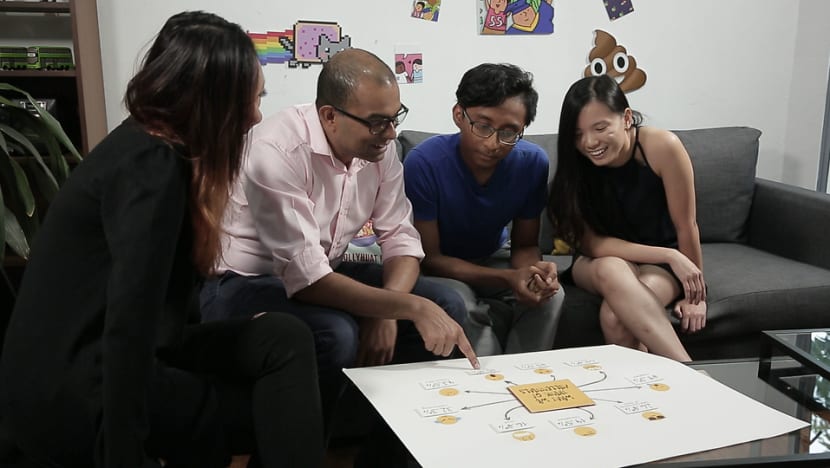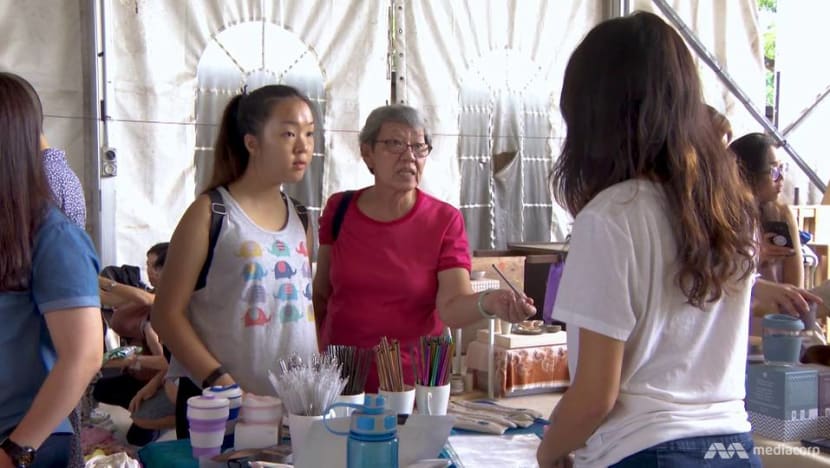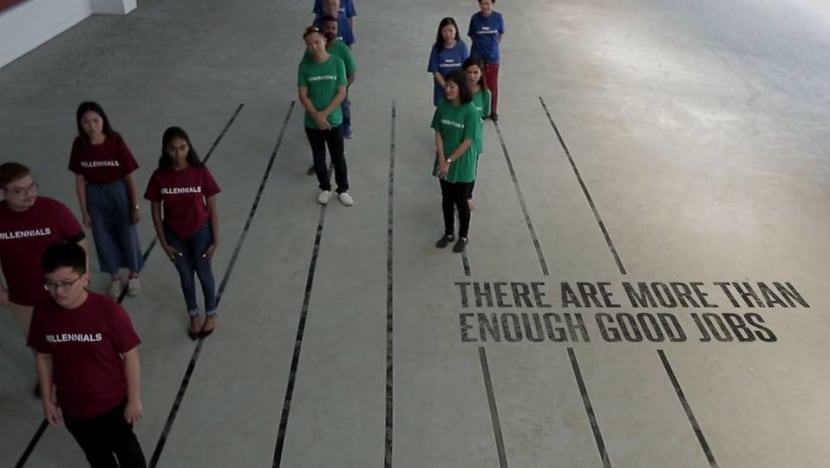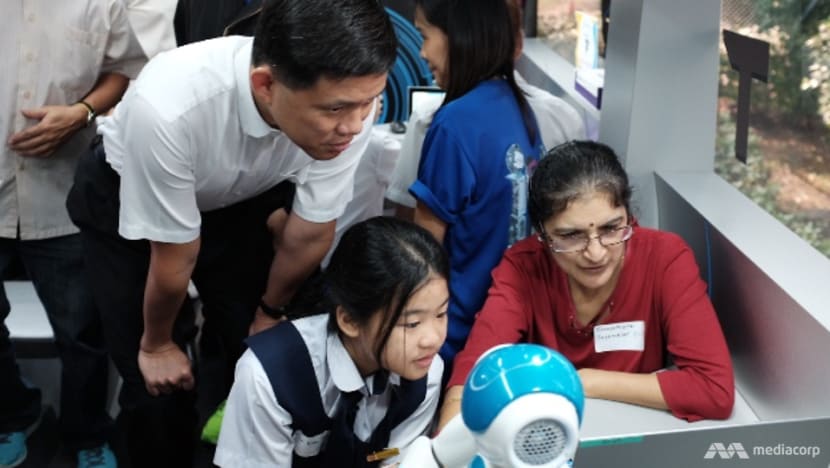commentary Commentary
Commentary: Regardless of age, here’s how to make sense of Singapore’s generation divide
A new generation is coming of age but what we have in common, as Singaporeans across the ages, should help us move beyond the discomfort we have regarding our differences, says Ng Chia Wee.

(Photo: CNA)
SINGAPORE: “What’s at stake here?” Dr Janil Puthucheary asked private educator Tong Yee, seeking his views on the generation divide in values.
The recent CNA documentary Regardless of Generation had explored Singaporeans’ attitudes across different age groups, in line with a survey which revealed that “impatient”, “overconfident” and “materialistic” were the top perceptions of my generation – millennials.
These perceptions had persisted despite some areas of policy agreement between generations. And even then, disagreements in other areas like LGBTQ acceptance and foreign talent risked overshadowing them.
READ: Commentary: Millennials, the burnout generation
Regardless of Generation brought to the fore an “overlooked, yet particularly urgent divide” but how do we now make sense of it all?
Should we be relieved at the areas of agreement, or worried about the revealed differences and negative stereotypes? What if we disagree with the results of the survey? As Dr Puthucheary asked, how much of it is perception and how much is truth ? Where do we go from here?
To make sense of it all – and begin to see how we can narrow the generation divide – let’s look past the noise to the heart of the issue.
For all its resulting complexities, the heart of the issue begins very simply with this: A new generation is coming of age.
COMING OF AGE
“Every generation that comes of age,” Education Minister Ong Ye Kung once said, “will transform and remake the society it lives in.”
As my generation comes of age, like most others that have come before us, we are beginning to push boundaries, challenge norms and question assumptions.

Quite naturally, this will cause some discomfort with older Singaporeans who may be less enthusiastic about ground-up action, especially against status quos they have long accepted.
Such discomfort may lead to somewhat negative perceptions of my generation.
Even when they were younger, the older generations would have come of age in different times, shaped by different formative experiences.
Using the classifications of Regardless of Generation, the pre-independence generation came of age when Singapore was a third-world nation – that was the age of survival.
But life soon improved, and Generation X came of age at a time of stability across the globe. As McKinsey consultants wrote in No Ordinary Disruption, the 25 years leading to the Global Financial Crisis was a tale of “continuity and persistent trends".
Today’s world however, the authors assert, is one of “near-constant discontinuity ”. Separately, against the backdrop of the Fourth Industrial Revolution, Klaus Schwab from the World Economic Forum had written that “the transformation will be unlike anything humankind has experienced before".
This is the backdrop against which my generation comes of age – in an era of disruption.
READ: Commentary: Facing disrupted futures, Singapore’s youth must put their mental health first
READ: Commentary: Here’s what Singapore’s human capital index in a world of disruption should look like
Granted, one’s formative experiences need not shape one’s values and priorities – but these have a high tendency to. Dr Puthucheary himself had tentatively suggested that perhaps my generation’s sense of entitlement is a result of our circumstances, such as resource strain due to an ageing population, an uncertain economic outlook and rising costs of living.
The sheer differences in formative experiences between generations would very likely have resulted in the differences in values, attitudes and priorities we see today, affecting how different generations perceive each other.

How do we begin to bridge these differences in values and attitudes, and change how different generations perceive each other?
Well here’s the twist: We don’t – at least, not directly.
COMMON INTERESTS, COMMON DISRUPTION
It would be futile to directly try and change the way entire generations see each other, or make us “more similar”.
Rather, we should adopt a subtler approach, by first accepting the reality of differences and then trying to find new common ground. This can in turn be done by embracing a new narrative based on a key identified common interest.
This key common interest should be one which strikes at the heart of what we are all most concerned about, despite starting from different values, attitudes and priorities.
Finding this key common interest may seem like a daunting task, but the answer may already be embedded in the key driver of this generational divide discussed above: Coming of age in an era of disruption.
READ: Commentary: The future is tech but where is Singapore’s engineering and IT talent?
This key common interest could be disruption - something which all generations have to face, albeit in different ways.
Millennials must enter a future of work which their formal education may not have readied them for. They are also likely concerned about the sufficiency of good jobs in Singapore.

The pre-independence generation has seen technology displace them from once-stable jobs and face the daunting task of staying relevant amid the need to work past retirement age.
Generation X, typically the breadwinners of their families, are caught in a race to constantly upgrade themselves and embrace career mobility or risk the prospect of wage stagnation.
This shared challenge of disruption strikes at the heart of what each generation would likely be most concerned about: Economic security. And in this shared challenge of “common disruption” lies the opportunity to find fresh common ground.
This new common ground can be brought to life through a new narrative of disruption, to be promoted by the Government and community groups. Taking inspiration from the subject-based banding reforms, rather than dealing with the challenges of disruption in “three generational streams”, we can approach it through “one common disruption, a challenge across generations”.
READ: Commentary: We have entered the age of stakeholder capitalism. The role of business has changed
From policy speeches to community dialogues, from house visits to parliamentary debates, ministers and Members of Parliament can mount a new concerted effort to reframe the narrative.
Community groups can employ this narrative as a framework for intergenerational conversations. What does disruption mean to you? How can we tackle disruption effectively as a society? How can each generation best contribute to doing so?
Such questions are also useful for anchoring the next phase of the Government’s engagement with Singaporeans on building a future Singapore together.
Indeed, having intergenerational conversations was a strategy suggested in Regardless of Generation, but their effectiveness will be limited if not embedded in a proper narrative frame.

Given how narratives can shape the way we see ourselves and others, and influence our attitudes and decisions, promoting and embracing a new narrative of “common disruption” across the generations could be key to narrowing generational divides.
WHAT’S AT STAKE HERE
Regardless of Generation, and the conversations that will likely follow, give us an opportunity to address a looming age divide early – across the globe, many societies have become polarised along generational lines, paralysing political and social progress.
As a small city-state, Singapore can ill afford such polarisation.
READ: Commentary: Do not fear retrenchment. Four tips for working professionals
Whatever the eventual strategies might be, finding common purpose based on shared interests will be key to narrowing generational divides as a new generation comes of age in an age of disruption.
What’s at stake here? Nothing less than the unity and cohesiveness of our society. Regardless of generation, surely that must be something worth working towards.
Ng Chia Wee is a second-year student at the National University of Singapore’s Faculty of Arts and Social Sciences and Tembusu College. He is also Director (Strategy) at Access Singapore, a ground-up organisation which seeks to provide mentorship and externship opportunities to students from less-privileged backgrounds.














